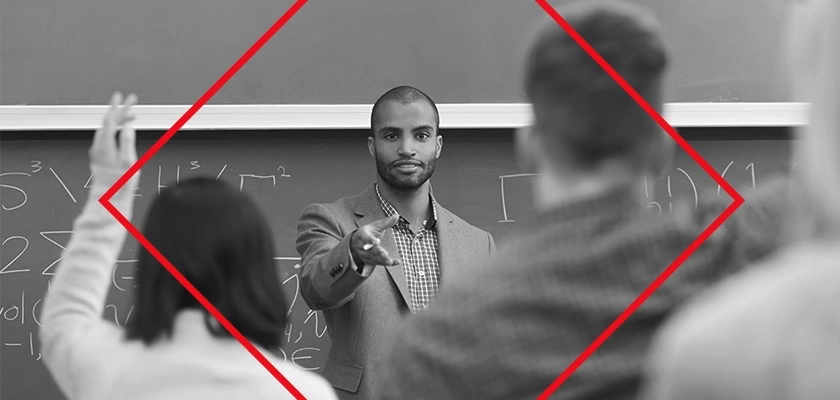Leadership Ethics
Leadership is more than being able to manage a team. Having an understanding of the value of ethics can bring out the best in others and build unity to reach common goals.

Author and educator John Gardner stresses the importance of leadership ethics when he says that leaders should not be judged solely in terms of decisiveness and efficiency, but more importantly, on the basis of values and moral reasoning. He agrees with philosopher Immanuel Kant that leaders should treat others as ends in themselves, not as objects or merely means to the leader's end. Gardner thinks leaders who do not behave ethically do not demonstrate true leadership1.
With one after another high-profile scandal in business and government, interest in the nature of ethical leadership has grown proportionally. Prominent scholars, including Ronald Heifetz, James MacGregor Burns, and Robert Greenleaf, have provided perspective on this important subject. A common theme is a need for leadership that is based on honesty, service to others, and moral courage2.
Leaders must understand the subject of ethics-- what it is and why it is important.
Ethics is the branch of philosophy concerned with the intent, means, and consequences of moral behavior. It is the study of moral judgments and right and wrong conduct. Some human judgments are factual (the earth is round); others are aesthetic (she is beautiful), and still others are moral (people should be honest and should not kill). Moral judgments are judgments about what is right and wrong, good and bad3.
The Spanish writer Cervantes wrote about ethics in Don Quixote:
"I know that the path of virtue is straight and narrow, and the road of vice broad and spacious. I know also that their ends and resting places are different; for those of vice, large and open, end in death; and those of virtue, narrow and intricate, end in life; and not in life that has an end, but in that which is eternal4."
Ethics is derived from the Greek word ethos, referring to a person's fundamental orientation toward life. Originally, ethos meant "a dwelling place." For the philosopher Aristotle, ethos came to mean "an inner dwelling place," or what is now called inner character. The Latin translation of ethos is "mos, moris," from which comes the English word moral. In Roman times, the emphasis shifted from internal character to overt behavior -- acts, habits, and customs5. In more recent times, ethics has been viewed as an overall human concern:
One of the chief problems is to determine what the basis of a moral code should be, to find out what one ought to do. Is right that which is the word of God given to man in the Ten Commandments? Is it what is revealed to us by conscience and intuition? Is it whatever will increase the sum of human happiness? Is it that which is the most reasonable thing to do? Is it whatever makes for the fullness and perfection of life? Above all, is there any absolute right, anything embedded, so to speak, in the nature of the universe, which should guide our actions? Or are right and wrong simply relative, dependent on time and place and cultural pattern, and changing with environment and circumstance? What, in short, is the basis of our moral values? These questions are of vital importance in a day when intellectual power threatens to outrun moral control and thus destroy humankind6.
Moral dilemmas often involve choosing between two "rights" or "goods," such as honesty versus loyalty, individual versus group, short-term versus long-term, and justice versus mercy. Rushworth Kidder identifies three mindsets for addressing moral dilemmas: Ends-based thinking, such as doing what is best for the greatest number of people; rule-based thinking, such as following the highest principle or duty; and care-based thinking, such as doing what you would want others to do for you (the Golden Rule). Kidder recommends using all three mindsets when making moral decisions7.
Ethical questions are important in all areas of life -- work and personal. A real-life ethical dilemma made famous by Hollywood is the story of Alvin York, played by actor Gary Cooper: Sergeant York was America's most decorated soldier in World War I. Because of deep religious conviction, Sergeant York registered as a conscientious objector, but his numerous appeals were denied. His battalion commander quoted chapter and verse from the Bible to persuade him that under appropriate conditions it was Christian to fight and kill. A marathon mountainside prayer convinced him that he could serve both God and his country by becoming a dedicated fighter8.
No Easy Subject
Ethics is a difficult subject, forcing people to think about moral issues with elusive answers. This is true now more than ever before. Consider the questions that people are being faced with today:
- The conscious creation of new forms of life. What are the benefits and penalties of creating new forms of life through recombinant genetics? Should people be cloned? If so, who should be cloned?
- Exploration and the use of outer space. Should people be exploring space? Are the huge financial sums spent on space exploration justified in view of the human misery on earth?
- Nuclear energy. What should be done with our knowledge about atomic energy? Should we build bombs that can destroy life, or should we apply this knowledge to human welfare? What should be done, and who is to decide?
- Information technology. Should everything that can be known be known by anybody anytime? Should children see the surface of Mars on a computer screen before they feel the surface of the earth --- its rocks, sand, water, and grass -- firsthand, with their own bodies? What should we do in response to the admonition not to become tools of our tools?
Aside from moral issues created by developments in science and technology, there are many ethical problems common to the workplace -- issues of quality, safety, property, and human relationships. It is the task of the leader to understand and make judgments on these difficult subjects9.
Highly visible and far-reaching examples of the importance of leadership ethics are the sexual abuse scandals at Pennsylvania State and Michigan State Universities, tragic situations showing how people with outstanding reputations can lose their way when confronted with competing values. Innocent people may suffer consequences from the failure of moral leadership. The message is that it is not enough to have an ethical compass unless it is activated in difficult circumstances. In tough moral dilemmas, a practical approach is this: For every decision you confront, project out five steps, and ask yourself if your action is taking you in the direction you want to go. Also, when faced with two negatives, think about which decision is easier for your conscience to live with10.
The Roots of Ethics
Ethics has both religious and secular roots. Religious ethics is based on a theistic understanding of the world. What is real, true, and good is defined by God. Secular ethics is based on a scientific understanding of the world. Reality, truth, and goodness do not depend on the existence of a god. Both religious and secular ethics may endorse many common values, such as the preservation of life and the importance of the Golden Rule. The primary difference is how values are justified.
The Secular Tradition
Aristotle (384-322 bc) was one of the first and perhaps most influential of all people to shape the ethics of Western civilization from a secular orientation. He believed that every type of animal has a common essence or nature and that human beings are essentially, or by nature, rational. He viewed rationality as the central and most significant trait distinguishing humankind from other creatures. Further, Aristotle taught that the good person is the one who lives most rationally and whose moral judgments and social conduct are born of contemplation and reason, in contrast to spontaneity and emotionality. Today, when we address a moral dilemma by saying, Let us use reason; let us use logic; let us think rationally about this, we are being ethical in the Aristotelian secular tradition11.
The Religious Tradition
All the world's religions make prescriptions for moral behavior. St. Augustine (354-430), for example, who generally is agreed to have had a greater influence on Western religious thought than any other writer outside biblical scripture, maintained that the naturally evil inclinations of humanity can be overcome only by divine grace. St. Augustine synthesized Plato's philosophy with Christianity. He believed that if we allow ourselves through faith to be drawn to God, we will overcome our basic immoral nature and eventually be reconciled in the city of God in heaven12.
Another Christian philosopher, Thomas Aquinas (1224-1274), integrated the philosophy of Aristotle with Christian theology. Aquinas taught that all people are endowed with a natural desire to be good. He believed that this inclination can be dormant in an individual and can even be perverted. Nonetheless, he believed it to be present in all people and impossible to destroy. Aquinas taught that to resist God's pull is contrary to human nature and that if we allow ourselves to follow God, we will fulfill our nature and will be purely good. Further, by acting out this goodness in our day-to-day lives, we will be moral and will experience the greatest meaning of which we are capable13.
Ethics, Humankind, and Other Animals
Whether based on religious belief or secular thought, ethics is a concern unique to humankind. People are the only creatures that combine emotion (feelings) with knowledge (information) and through abstract reasoning (thought) produce a moral conscience or a sense of what should be. Some ideas about right and wrong are of pre-human origin. Indeed, such social virtues as self-sacrifice, sympathy, and cooperation can be seen among many other species, such as elephants, porpoises, and lions. However, more than 40,000 years ago, the human race evolved into beings who can distinguish between what is and what ought to be, and it is this attribute that separates people from all other animals14. In The Descent of Man, biologist and social philosopher Charles Darwin concludes the following of ethics, humankind, and other animals:
I fully subscribe to the judgment of those writers who maintain that, of all the differences between man and the lower animals, the moral sense of conscience is by far the most important. It is summed up by that short but impervious word, ought, so full of high significance. It is the most noble of all attributes of man, leading him without a moment's hesitation to risk his life for the life of a fellow creature, or after due deliberation, impelled simply by the deep feeling of right or duty, to sacrifice it in some great cause15.
Moral Development
How is morality developed? The English philosopher John Locke, one of the most important philosophers of modern times, viewed the newborn child as a "tabula rasa," or blank tablet, on which a life script would be written. He believed that experience and learning would shape the content, structure, and direction of each person's life. In this sense, the ethics of the infant are amoral -- that is, there is no concept of good and bad or right and wrong that is inborn. After birth, babies soon discover that they are rewarded for certain things and punished for others. As a result of this early programming, they develop an understanding of what the adult world considers good and bad. Thus, a social conscience is begun, and this becomes the foundation for future moral development16.
Through modeling and socialization, the older community passes on ethics to young people. The words and actions of parents, teachers, and older companions teach and reinforce morality before children develop their own critical faculties. Ben Franklin's advice to "teach children obedience first so that all other lessons will follow the easier" captures the spirit in which moral values are taught17. When practiced over time, ethical behavior becomes habitual and part of people themselves. By telling the truth, people become trustworthy; by serving others, people become kind; by being fair, people become just18. Practically speaking, the three most important influences on character formation are
- Associations. Family, friends, and role models help shape our future lives. The example and encouragement of some people may improve us, while that of others may pull us down. Whenever possible, avoid toxic people and keep company with agents of goodness.
- Books. The printed page and other media can poison us with wrong accounts and harmful thoughts, or they can enlighten and lift up our lives with reason and spirit fundamental to a healthy person. Consider the influence of just one book, Don Quixote, a cultural landmark of the Spanish-speaking world and second only to the Bible in terms of total number of copies printed. Cervantes's courageous hero refuses to conform and seeks to right the wrongs of the world, providing inspiration to generations of people. Few books are as compelling and instructive as a child's picture book. Consider the lifelong character lessons taught by The Little Engine That Could, The Ugly Duckling, The Velveteen Rabbit, The Three Little Pigs, and a multitude of Golden Book children's stories.
- Self-concept. When our thoughts and actions are not consistent, the result is dissonance that the mind cannot tolerate. We do what we do to be consistent with who we think we are. Our primary motivation is not self-preservation but preservation of the symbolic self. Whoever considers him- or herself to be honest, brave, and worthy is likely to be so, as our outer lives are first decided in our inner hearts19.
Charles Darwin summarizes human morality in this way: "Ultimately our moral sense of conscience becomes a highly complex sentiment -- originating in the social instincts, largely guided by the approbation of our fellow-men, ruled by reason, self-interest, and in later times by deep religious feelings, and confirmed by instruction and habit20." An individual's morality is one of the most important dimensions of leadership, determining whether people will trust and respect the leader.
Ethics and the Legal Department
The philosopher Lou Marinoff gives practical advice about leadership and moral dilemmas: "Everyone's ethical warning lights go off at different times. Although working will always involve compromises, it is important to know when an action may take you over a line you do not want to cross. In these situations, your conscience should guide you21." In the world of work, ethics is typically the purview of the legal department. But being legal may or may not mean being moral. Legality includes everything the law permits or doesn't expressly forbid. Morality is an even older idea, predating even legislated laws. In 1859, the lawyer and future president Abraham Lincoln said, "You must remember that some things legally right are not morally right22."
By all means, you should do what the people in the legal department advise to abide by the law, but you must never lose your own moral compass. If something makes you morally upset, so much so that you know what you are doing is clearly wrong, don't let legality alone appease you. The argument that "I was only following orders" won't absolve you if you make a moral error. Remember, every society has laws, but not all laws are just. So what is a person to do? The best advice is to follow the dictum "non-harm to sentient beings." This is the basis of every professional code of ethics and every moral society. If your actions cause harm to others, they are immoral. Systems of morality and the laws of a society can get complicated, but if you live by this basic requirement, you will have a clear conscience23.
References:
1J. Gardner, On Leadership (New York: Free Press, 1990).
2M. Velasquez, Business Ethics, 7th ed. (Upper Saddle River, NJ: Prentice Hall, 2011).
3H. Titus and M. Keeton, Ethics for Today, 5th ed. (New York: Van Nostrand, 1976); and O. Ferrell et al., Business Ethics (Boston: Cengage/South-Western, 2016).
4M. de Cervantes Saavedra, The History of Don Quixote de la Mancha, trans. S. Putnam (Chicago: Encyclopaedia Britannica, 1990).
5Titus and Keeton, Ethics for Today.
6N. Berrill, Manís Emerging Mind (London: Oldburne, 1962).
7R. Kidder, How Good People Make Tough Choices (New York: HarperCollins, 2009).
8R. Hughes et al., Leadership (New York: McGraw-Hill, 2015); and A. Bandura, "Mechanisms of Moral Disengagement," in W. Reich, ed., Origins of Terrorism (Cambridge: Cambridge University Press, 1990), pp. 161ñ91.
9N. Tichy and W. Bennis, Judgment (New York: Penguin, 2009); and J. O'Toole, "The True Measure of a CEO,"Across The Board (September/October 2005), pp. 45-48.
10Interview with James Votruba, "Advice from Clifton Wharton Jr. on Confronting Moral Dilemmas," 2013.
11Aristotle, The Nicomachean Ethics, book 10, chap. 5, trans. H. Apostle (Dordrecht, Netherlands: Reidel, 1975); and J. O'Toole, Creating the Good Life (New York: Rodale, 2005).
12V. Bourke, ed., The Essential Augustine ≠(Indianapolis, IN: Hackett, 1964).
13D. Kennedy, St. Thomas Aquinas and Medieval Philosophy (New York: Encyclopedia Press, 1919).
14Titus and Keeton, Ethics for Today, p. 39.
15C. Darwin, The Descent of Man (London: J. Murray, 1871); and C. Darwin, The Origin of Species by Means of Natural Selection (New York: Modern Library, 1936), p. 471.
16J. Locke, "An Essay Concerning Human Understanding," 1690.
17B. Franklin, Poor Richard's Almanac (New York: Ballantine Books, 1977).
18L. Pojman, Ethical Theory (Belmont, CA: Wadsworth, 1995); J. Piaget, The Moral Judgment of the Child (New York: Free Press, 1997); and J. Marx, Season of Life (New York: Simon and Schuster, 2004).
19H. Thoreau, in C. Boardman and A. Sandomir, eds., Economy from Walden, 5th ed. (Boston: Pearson, 2002); and L. Festinger, Theory of Cognitive Dissonance (Evanston, IL: Harper & Row, 1957).
20C. Darwin, The Descent of Man (London: J. Murray, 1871).
21L. Marinoff, Plato, Not Prozac! (New York: HarperCollins, 2000), pp. 162ñ63.
22William Henry Herndon and Jesse William Weik, Herndon's Lincoln (Chicago: Belford Clarke, 1889).
23D. Rhode, Moral Leadership (New York: Wiley & Sons, 2006); and O. Farrell et al., Business Ethics (Boston: Cengage/South-Western, 2016).



